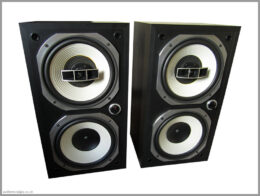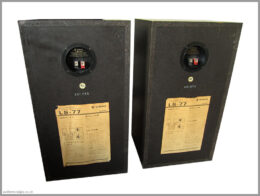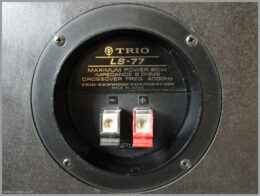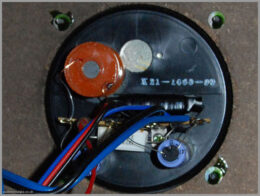TABLE OF CONTENTS
MY STORY
These strange looking speakers were purchased from eBay. I found them when I was searching for coaxial speakers. I have never seen Trio LS-77 before and I did not know much about Trio brand at the time. I perhaps paid for them more than they were worth, but I liked the 80s look and the fact that these are quite rare. More importantly, I was really curious how these were going to sound…
SPEAKER INFO
Model History
As the name suggests, these Trio LS-77 speakers were made by Trio Corporation, which in 1986, officially rebranded to Kenwood Corporation. From what I’ve gathered, they were only released to Japanese market. I recall reading somewhere that the LS range was designed with studio monitoring in mind, but not sure how much truth there is in that. Please email me if you are able to provide some more info about these rare speakers.
Design
Trio LS-77 are two way loudspeakers, each featuring 10″ coaxial driver and 10″ passive radiator, enclosed in a medium sized cabinet. If you are not familiar with the term ‘coaxial’, it simply means that woofer and tweeter diaphragms are located on the same axis. This setup is not unique to Trio speakers. Many well known manufactures such as Coral, Celestion, Tannoy, or Kef, used to produce (and some still do) coaxial drivers.
TRIO LS-77 SPECS
| Frequency Response: | 35 – 20,000Hz |
| Sensitivity: | 93.5dB (1W input, measured at 1m) |
| Impedance: | 8Ω |
| Power Capacity: | 60W (continuous program) |
| High & Low Frequency Driver: | 250mm (10″) Coaxial Driver with Horn Loaded Bullet Tweeter and 250mm (10″) Paper Diaphragm |
| Passive Radiator: | 250mm (10″) |
| Crossover Frequencies: | 4,000Hz |
| Enclosure Type: | Closed |
| Enclosure Dimensions (HxWxD): | 600x330x297mm (23.5x13x12″) |
| Weight: | 15kg (each speaker) |
| Production Year: | 1976 |
| Price When Launched: | £106 for a pair |
| Equivalent Present Day Price: | £690 for a pair |
| Current UK Price: | £50 to £150 for a pair |
LOOK & FEEL OF TRIO LS-77 SPEAKERS
Not everyone will be able to appreciate the look of LS-77s. White speaker cones against black enclosures look very 80s. But, I like them a lot. I always liked the look of speakers like Yamaha NS-1000 or JBL L100; and Trio LS-77 remind me of both.
The enclosures are made of quite thick chipboard with one internal bracing. They are finished in black worktop laminate – not as nice as wood veneer but a lot more scratch resistant.
The speaker drivers are very neatly made with a lot of attention to details. Glue is only where it needs to be and both diaphragms and suspensions look very clean. Each speaker features a passive radiator as well as a coaxial driver. Both driver and passive radiator baskets are made of die cast alloy with good amount of ‘breathing’ space. The cones are made of rigid paper suspended on fabric surrounds (they will not deteriorate with age). I’m not sure about the tweeter diaphragms’ material as at the time of testing I did not feel comfortable taking these drivers apart. The tweeters are in-line with bass cones and generate the sound via aluminium horns, which expand horizontally (presumably to aid with horizontal dispersion).
The crossovers are hardwired but are very basic and made of rather poor quality components. This is somewhat disappointing, as all other components are very well made. Treble potentiometers are not the best quality but they seem to work just fine.
SOUND OF TRIO LS-77
First Impressions
With an exception of a couple of models, Japanese speakers do not have a very good reputation in the UK. I personally do not believe that country of origin has anything to do with the sound of the speakers. So trying to stay away from any stereotyping I’ve commenced my test. First thing that I’ve noticed about these Trio LS-77 was the efficiency. It seemed lot higher than what I experienced with majority of modern speakers. However, nothing comes for free. High efficiency and a relatively small cabinet volume, meant that the bass was not going to go very low.
Bass
Bass is quick and well controlled, with a fairly good attack. Just bear in mind that my impression may have been influenced by the lack of bass extension, which often makes us perceive the bass as ‘faster’. Although initially enjoyable, after longer listening sessions, I’ve stared noticing a little boxiness in the bass. This, combined with limited extension means that that people who appreciate full bodied sound, will not be very happy with these speakers.
Midrange, Treble, and Soundstage
Midrange and treble are acceptable but there is nothing special about them. Vocals sound a little flat and string instruments are a little coloured. Definitely not the most truthful presenters. Level of details is good, but they are number of speakers that are a lot more detailed than these. Stereo imaging is OK, however, the soundstage is rather shallow.
All of these means that when it gets to the more ’emotional’ stuff that requires engagement, Trio LS-77 really struggle. This is also the reason why I struggled to write this review… it’s really hard to force yourself to spend long time listening if you don’t quite like what you are hearing.
CONCLUSION
Trio LS-77 are not the most engaging speakers and can sound flat at times. Very good attack though. Good if your are on a tight budget and can pick them up for £50. If I was to keep these for myself, it would only be for collector’s purposes.
| Balance of Sound: | |
| Neutrality of Tone: | |
| Transparency: | |
| Soundstage: | |
| Attack: | |
| Engagement: | |
| Total Score: |
Reviewed: November 2011 | Published: December 2014









